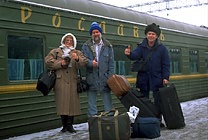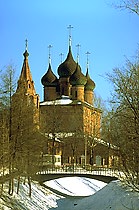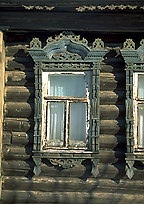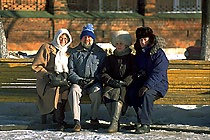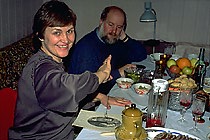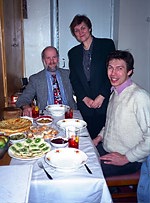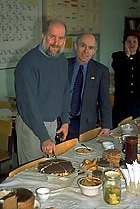"I Am A Soviet Woman!" exclaimed Leah in her word-by-word English. At 84 years old and probably only 84 pounds, Leah did not need our help with opening a tin of sardines in oil which were to be part of our breakfast. Hustis stopped preening his fur and watched patiently from his perch atop the refrigerator. The other breakfast item today was boiled then fried spaghetti noodles served with sprinkled grated cheese and diced green onions.Go to Chapter 7After a week in Perm, it was good to get back to Leah's Moscow apartment which now feels "like home" to us. I guess I'm not too old to enjoy being "mothered" a little bit! I love the sparkle in her eyes and her charming wit. Her facial expressions usually convey the essence of the message before she can get the words out in English. She is certainly the person that I will most miss after we leave. When an especially witty thought comes to her mind, and she has constructed the message in her mind, she raises her finger before making the pronouncement: "Dinner For The Cat!" or "I Feel Fantastic!" or "You not like?" are typical. My favorite however requires a bit of background information. Leah's apartment is filled with books of art and literature. Cezanne, Monet, Segantini, Hemingway, Elliot, and Salinger are all at home here. Knowledge of art, literature and music is common for Russians, young and old alike. So it sounded especially humorous when Leah ceremoniously passed out a Kleenex tissue to everyone after dinner and said with certainty "Russia Is A Very Cultured Country!"
These past several days Leah has been "on the computer" finishing a research paper for publication. Leah is a metallurgist and she still goes to work once in awhile. She gave me a signed reprint from one of her articles that appeared in 1995 in the Journal of Metallurgy. This journal also is available in English in the USA. One time Leah came into this room to use the computer and saw that I was using it. She said "You will use the computer? (pause) Fine! I will sew!" Last night during "tea" it turned 9 PM and Leah stood up and exclaimed "Its Time For Santa Barbara!" (She was baffled that I didn't watch this important cultural program from America. Its a bit like Dynasty, I am told. More blank expressions from this clueless American.) Minutes later she was back, grousing that only Yeltsin and football were on TV.
In addition to Leah, a family of three lives in this spacious Moscow apartment. Rosa and Timus and their 22-year old daughter, Inna live here. Rosa and Timus grew up in Tartarya, 2000 km SE of here. During the Great Patriotic War Leah was evacuated from Moscow to their small village in Tartarya where she became friends with Roza's mother. The families have remained friends for three generations. In this village, Leah taught French and German at a high school. Rosa and Timus have known each other their entire lives.
Timus has dreamed all of his life of visiting America. He said that despite growing up in Cold War times and the anti-American propaganda of the 1950s, he always thought that America had to be a very good country because it has produced such great musicians such as Gershwin, Glenn Miller and Scott Joplin. He told us a joke from Soviet times: "In the Soviet Union we have so many 'Heroes of Socialist Work' but in America they have no such 'Heroes of Capitalist Work.' Then why are we so far behind the Americans?"
Timus and Inna have good English language skills. Timus is a mathematician at an university and Inna is a student of computer science at Moscow State University. Inna showed me how to send e-Poshta a month ago. Timus explained one day that so-and-so knew so-and-so who's daughter is becoming a chemistry teacher and she saw one of our programs in Moscow two weeks ago and thought it was great. I'm happy! (Timus also came to one of our programs.)
This past week we went to Yuroslavl and Tver to give programs. Both cities are 3 - 4 hours north of Moscow. Both cities have about a half million people. Both cities are clean, picturesque with great bridges spanning the wide Volga River. The main difference between the two cities is the churches. Yuroslavl churches are known for their beautiful green onion-shaped cupolas. Dozens of them define the landscape. On a three hour walking tour in bitterly cold but sunny weather, Lyudmila, our host, explained that half of Yuroslavl's beautiful churches were destroyed during the 1930s under an edict from Stalin. But in unfortunate Tver all the churches were destroyed. Every last one. Tver was renamed Kalinin but now in "free" Russia it is named Tver again.

We went to Yuroslavl first. We were put up in a comfortable suite of four rooms including two bedrooms, a dining room and a furnished kitchen. Amenities also included a toilet seat this time. On our first night in Yuroslavl we went for a walk at night (a beer run to be honest) and as we rounded the corner of our dormitory we found ourselves on the grounds of a 17th century church. The great onion domes were silhouetted by the moon, an unforgettable image.
At Yuroslavl, approximately 100 teachers attended our program. Everyone applauded at the end as usual. Then Boris, the department chair, said a few words and then more applause. Then he said a few more words and hugged each of us and there was even more applause. I meant to ask Sergei what that was all about. Our programs take about 2 - 3 hours and we are usually swarmed afterwards with people asking questions. By the time it's over, we are thoroughly exhausted. That night we had dinner in our suite. Elena and Lyudmila prepared boiled potatoes and salads. Boris arrived with fried fish that he had caught by "fishing through the ice." The fish were breaded and fried with heads still on. Everyone got a half of a fish. As the esteemed guests, we got the halves with the heads on and they ate the tails. Life is strange.
During our walking tour of "Yuro" we visited a tiny little church with just one small cupola. It was the tiniest church in Yuroslavl. But what is remarkable about this church is not just its size. The church stands just a few dozen meters from an enormous, ugly 1970s-style Soviet party bureaucratic building. When the latter was being constructed, everyone assumed that the little church would be destroyed but somehow this didn't happen. To me the little church stands as a symbol of courage and hope for the Russian people who have endured seven decades of the Soviet way. A ray of hope for the faithful during decades of official atheism. About half of Yuro's churches are now open for services. The other half will be someday. Some are now art galleries, museums or warehouses. The art galleries and museums have to be relocated before the property can be given back to the Russian Orthodox Church. It all takes more money than anyone here has.
In Tver we stayed in the home of our host Lyudmila Ivanovna Lagunova. (Two Lyudmilas in two days! Who would have ever imagined?) Lyudmila's apartment was comfortable and spacious. It had a living room/dining room, a small bedroom, a den, kitchen, and two balconies. In Russia, the toilet is always in a separate room from the sink and bathtub. I have seen only one shower stall. Usually, bathtubs are equipped with shower wands and one sits in the tub to shower because there is no curtain. Lyudmila's daughter Natalya lives in Boston and they communicate by e-Poshta. I am carrying a package back home for Natalya. Lyudmila loves America very much but loves her work with chemistry teaching pedagogy as well. She would like to live near her daughter but would have to give up the work she loves.
Lyudmila is yet another inspiring woman. As a young girl in Siberia her parents took in 2 - 3 orphans all the time. Lyudmila has done the same here. She has "sponsored" about six orphans in a system similar to foster care. Here though, the children live in dormitory style orphanages. They come to Lyudmila's apartment frequently and several times a year and she fixes them a great dinner. Now her "children" as she calls them are about 20 years old and a few of them have children of their own. She showed us a picture of the group. She is paying for dance lessons for some of the little ones. They all still live in poverty. Lyudmila has equipped the bedroom with a crib because one of her children, now married, will give birth soon and after the baby is born, they will live with her for awhile. When Lyudmila visits her daughter in Boston, she returns home with suitcases of clothes from the Salvation Army for her children.
Lyudmila coordinates a continuing education program for chemistry teachers. She is the head of the Chemistry Department at the Institute of Teachers' Education in Tver. Teachers from all around the entire region spend one day a month at a day-long pedagogical meeting. We were their program on February 28th. The teachers always bring foods from home to be shared in a pot luck lunch. We ate jams made from wild berries, pickles, peppers, cakes, sandwiches, soup and other foods.

February 28th was also my birthday. The day started with Elena Rotina presenting me with a bottle of a fruit flavored alcoholic health tonic at the train station at 8 AM -- along with three kisses on my cheeks as is a Russian birthday custom. Ed and Sergei bought me a cake. At our program in Tver, Lyudmila also told the audience that it was my birthday and everyone applauded.
We have spent a lot of time on Russian trains. Quality varies a great deal. On the train back from Tver, we sat for 3 hours on plywood boards. I won't complain though because for our farewell party on March 7th in Moscow, Lyudmila rode the train from Tver for 3 hours each way just so she could attend and say "Da Svee Dan-ya!"
Back to the Table of Contents
